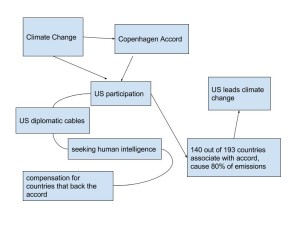The main ideas behind my diagram revolve around the Wikileaks cables from the Copenhagen Accords. First of all, the issue is formed behind the problem of climate change. This issue led the UN to bring together 193 countries to discuss what the world needs to accomplish in terms of creating a healthier planet. This created the Copenhagen Accords. Once the delegates assembled, however, it became obvious that the US was sending secretive messages to many other countries in favor of signing the weak document. First, the United States used resources like the CIA to discover information about the other countries participating. At times, they chose to work w h the poor countries who needed compensation to deal with the repercussions. One instance that this can be seen is with Bolivia, where the US cut aid because of “cit[ed] opposition to the accord”. The US participated in creating the terms and therefore helped the countries they were working with get the terms that they believed were fair. This participation as well as the “wheeling and dealing” of the United States helped countries like Saudi Arabia sign the document. Moving on, the US participation helped to enlist 140 countries to at least promise to sign the accord. This means that little debate went into the document and the terms were much more lenient than they could, or should, have been. In the end, this situation ended with the US leading the debate on climate change.
In my opinion, this whole encounter was not approached in the correct way. Although I understand that these are private conversations, and the people who took part in them would have liked them to stay private, I believe it is important that the public at least know that they happened. The specific contents need not be discussed or leaked to the point that they were, but I think that the public deserves the justice of knowing what deals our country is making in terms of our environment. I think that the US government should have led the distribution of information regarding this transaction. A very important consequence of the actions of the United States delegates was that the debate and discussion was severely limited. Because of this, some may argue that proper mitigation for climate change will not be fulfilled by the appropriate countries. This has to do with the issue of ethics as well as individual vs collective responsibility. Although the United States has the means and the technology to develop more responsible methods in terms of the use of natural resources, they instead put their ample funds towards coercing other delegates to sign a “toothless” contract, so to speak. I think that if the US had considered what they were doing in terms of ethically sound communications, they would be trying to convince others to do their part in cleaning up our world. In terms of individual action, the United States had the chance to get the rest of the countries on board for a much more thorough accord in which the environment would get cleaned up. However, they chose to use ethically un-sound methods to achieve their goal of lack of actual repercussions.


Hey Rebecca! My name is Dorish Nguyen and I’m a student studying aerospace engineering at Penn State University Park. Here’s a link to my blog if you’re interested:
http://geog030.dutton.psu.edu/2016/04/08/climate-change-module/
In my blog I also spoke about how the United State’s actions really dealt with ethics and individual vs collective action. The United States did not handle the situation in a respectable manner. I really think that by leading an example through individual action can really help the United States influence others to take part in reducing their own emissions. Through this, an agreeable collective action can be implemented to further reduce climate change. Great post and good luck with the rest of the semester!
– Dorish
Hi my name is Ryan Daley. I agree with you in that these issues that were being discussed at the Copenhagen Climate Change Summit should have been made aware to the public. The diplomacy was definitely not handled in the right way and if it was i think the summit would have yielded much better results. Here’s a link to my post.
http://geog030.dutton.psu.edu/2016/04/08/module-9-ryan-daley/